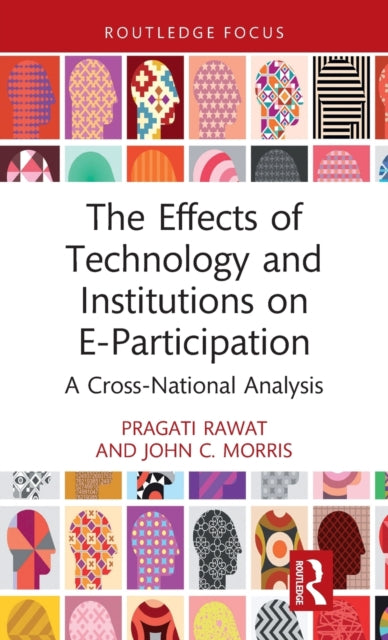Pragati Rawat,John C.Morris
The Effects of Technology and Institutions on E-Participation: A Cross-National Analysis
The Effects of Technology and Institutions on E-Participation: A Cross-National Analysis
YOU SAVE £2.50
- Condition: Brand new
- UK Delivery times: Usually arrives within 2 - 3 working days
- UK Shipping: Fee starts at £2.39. Subject to product weight & dimension
Bulk ordering. Want 15 or more copies? Get a personalised quote and bigger discounts. Learn more about bulk orders.
Couldn't load pickup availability
- More about The Effects of Technology and Institutions on E-Participation: A Cross-National Analysis
Pragati Rawat and John C. Morris examine the factors that influence e-participation in different countries,using quantitative panel data to explore the influence of technology and institutions. The study identifies a set of antecedents that influence e-participation and develops a conceptual framework supported by public policy and socio-technical theories. The authors utilize secondary data from the UN and World Economic Forum to measure the dependent and explanatory variables and analyze the panel data statistically. The findings reveal the role of technology as a mediator and moderator for institutions' impact on e-participation.
Format: Hardback
Length: 118 pages
Publication date: 15 December 2021
Publisher: Taylor & Francis Ltd
In their book titled "The Effects of Technology and Institutions on E-Participation," Pragati Rawat and John C. Morris delve into the intricate factors that contribute to the varying levels of e-participation across different countries. While cross-sectional studies have been prevalent, there has been a scarcity of in-depth examinations of cross-national studies in this field. This book aims to bridge that gap by employing quantitative panel data to explore the influence of technology and institutions, as well as the complex interplay between them, in a mediation and moderation analysis.
The current study conducts a comprehensive review of the scholarly literature on "offline" and "online participation" to identify a comprehensive set of antecedents that shape e-participation. A conceptual framework is developed, drawing upon theories from the realms of public policy and socio-technical perspectives. The authors utilize secondary data, primarily sourced from the United Nations and the World Economic Forum, encompassing surveys conducted across 143 countries across three waves. Through statistical analysis of the panel data, they unveil the significant role of technology as both a mediator and a moderator in the impact of institutions on e-participation.
This book offers a groundbreaking country-level analysis that will captivate academics and students specializing in e-government and Digital Government, Public Policy, Public Administration, Public Sector Innovation, and Public Participation. It sheds light on the diverse factors that shape e-participation, providing valuable insights into the dynamics between technology, institutions, and public engagement in the digital age. By examining the experiences of different nations, this book contributes to our understanding of the factors that promote or hinder citizen involvement in online platforms and initiatives.
The findings presented in "The Effects of Technology and Institutions on E-Participation" have the potential to inform policymakers, practitioners, and researchers alike. By understanding the interplay between technology, institutions, and e-participation, policymakers can develop strategies and policies that foster greater digital inclusion and promote active citizen engagement. Practitioners can utilize these insights to design and implement effective e-participation initiatives that resonate with diverse populations and promote inclusive and democratic decision-making processes. Researchers can further explore the nuances of these relationships and develop new theories and models that enhance our understanding of e-participation and its implications for society.
In conclusion, "The Effects of Technology and Institutions on E-Participation" is a seminal work that offers a comprehensive and insightful examination of the factors that shape e-participation across different countries. By leveraging quantitative panel data and drawing upon a rich theoretical framework, the book provides valuable insights into the dynamics of technology, institutions, and public engagement in the digital age. This book is a must-read for academics, policymakers, practitioners, and researchers interested in understanding the future of citizen participation and the role of technology and institutions in shaping it.
Weight: 288g
Dimension: 143 x 303 x 14 (mm)
ISBN-13: 9780367755492
This item can be found in:
UK and International shipping information
UK and International shipping information
UK Delivery and returns information:
- Delivery within 2 - 3 days when ordering in the UK.
- Shipping fee for UK customers from £2.39. Fully tracked shipping service available.
- Returns policy: Return within 30 days of receipt for full refund.
International deliveries:
Shulph Ink now ships to Australia, Belgium, Canada, France, Germany, Ireland, Italy, India, Luxembourg Saudi Arabia, Singapore, Spain, Netherlands, New Zealand, United Arab Emirates, United States of America.
- Delivery times: within 5 - 10 days for international orders.
- Shipping fee: charges vary for overseas orders. Only tracked services are available for most international orders. Some countries have untracked shipping options.
- Customs charges: If ordering to addresses outside the United Kingdom, you may or may not incur additional customs and duties fees during local delivery.


